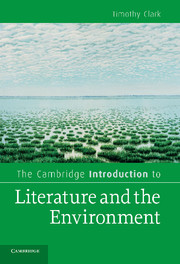Book contents
- Frontmatter
- Contents
- List of illustrations
- Preface
- Acknowledgements
- Introduction
- Romantic and anti-romantic
- Chapter 1 Old world romanticism
- Chapter 2 New world romanticism
- Chapter 3 Genre and the question of non-fiction
- Chapter 4 Language beyond the human?
- Chapter 5 The inherent violence of western thought?
- Chapter 6 Post-humanism and the ‘end of nature’?
- The boundaries of the political
- Science and the struggle for intellectual authority
- The animal mirror
- Notes
- Further reading
- Index
- Cambridge Introductions to …
Chapter 6 - Post-humanism and the ‘end of nature’?
Published online by Cambridge University Press: 05 June 2012
- Frontmatter
- Contents
- List of illustrations
- Preface
- Acknowledgements
- Introduction
- Romantic and anti-romantic
- Chapter 1 Old world romanticism
- Chapter 2 New world romanticism
- Chapter 3 Genre and the question of non-fiction
- Chapter 4 Language beyond the human?
- Chapter 5 The inherent violence of western thought?
- Chapter 6 Post-humanism and the ‘end of nature’?
- The boundaries of the political
- Science and the struggle for intellectual authority
- The animal mirror
- Notes
- Further reading
- Index
- Cambridge Introductions to …
Summary
Would someone from five hundred years ago actually recognise many modern people as human beings at all? Jacques Derrida's question may introduce the extraordinary arena of debate, fantasy and politics known as ‘post-humanism’. This concerns the way recent scientific and technical developments challenge inherited concepts of what the ‘human’ is or means. We live at a time when the question ‘what is man?’ no longer allows the leisure of theological and philosophical speculation, but may take on ‘a terribly concrete and urgent form’. Derrida, for instance, writes of the fear that some future manipulation of the human genome could become a ‘crime against humanity’, something ‘against the essence-itself of humanity, against an idea, an essence, a figure of the human race, represented this time by a countless number of beings and generations to come’.
Other debates concern nano-technology, genetic modification of plants and animals, gene therapy, biometrics, cloning, stem cell research, artificial life, artificial intelligence and new reproductive technologies. All challenge given demarcations as to what is ‘natural’ and what is not. Slavoj Žižek writes: ‘nature is no longer “natural”, the reliable “dense” background of our lives; it now appears as a fragile mechanism which, at any point, can explode in a catastrophic manner.’ Some modern technical and scientific developments no longer merely aim to dominate nature, but actually to supplant it.
- Type
- Chapter
- Information
- Publisher: Cambridge University PressPrint publication year: 2011

